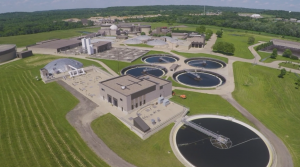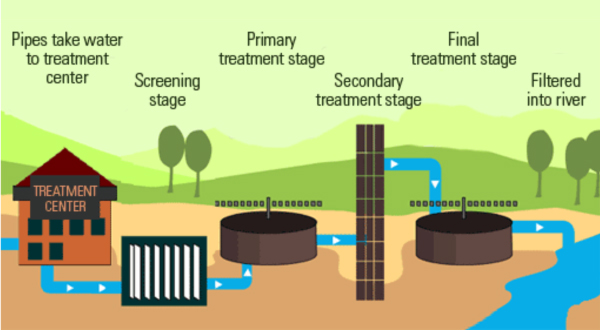Sewage Treatment Plant
Industrial wastewater treatment involves removing dirt, chemicals, organic matter, pollutants, and any other types of materials from the water used during an industrial process, either to safely release the water back into the environment or to put it back to industrial use.

Two major types of methods are used to treat wastewater – biological processes, which involve the use of biological matters such as bacteria to break down the waste matter in the water, thus making it harmless. However, this method is usually restricted to household wastewater. For the water coming from industries, the physical method is much preferred. This method helps in removing chemicals and other toxins that, if left in water, can be harmful to the environment. Usually, a dedicated industrial wastewater treatment plant is required to help companies deal with the wastewater they produce.
A number of industries, ranging from electric power plants to mines and food companies produce some amount of wastewater. It is always in the benefit of the company to minimize the volume and toxicity of this wastewater, for various reasons. One, the production of a large amount of wastewater means that the company is not properly using or over-using a precious resource. Two, production of wastewater is often subject to legal ramifications – companies can face hefty fines and a beating in the public image if they get in the news for such a matter. Lastly, the general public and civic society are increasingly becoming conscious of the role industries play in polluting the environment, and many agencies do not hesitate in publically calling out companies on traditional and social media if they feel that the company is using poor wastewater practices. Thus in such scenarios, it is in every interest of a company to engage in an effective wastewater treatment plant process.
But, how does one find a dependable sewage treatment plant supplier, given the importance this process has? Here are some important factors to look out for –
- The type of water the industry produces – is the water coming out chemical-laden, or is the temperature of it too high? Different types of contaminants such as metals, oils, suspended solids etc. will require a different type of system and approach to ensure effective industrial effluent treatment.
- The regulations with regard to water discharge – what are the legal requirements of the wastewater quality that the industry releases? It is absolutely necessary to remain well below the prescribed levels of contamination if the water is being released into the environment. If the water is being reused, cleanliness becomes all the more important to ensure that the industrial process comes to no harm.
- The method of wastewater treatment of course, also needs to be cost effective. No profitable business would or should spend an exorbitant amount on a part of the industrial process that is merely a requirement or at best a minor cost-saving (if the water is reused), and something that does not add to the final product of the industry.
- The method of treatment should also be the latest in terms of technological development. Though it may be a slightly heavier investment than a tried and tested method, advanced models usually give much better yield and a lower cost, thus making them a better money saver in the long run.
All of these points above make the process of selecting from amongst the wastewater treatment plant companies all the more complex. Who can one rely on to take all these points into consideration and give one’s company the best in industrial wastewater treatment?
